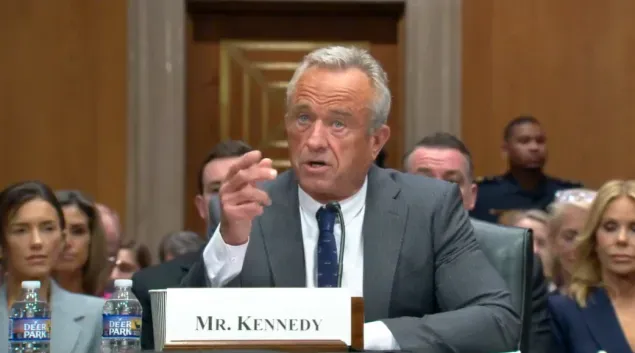
Scores of current and former federal health workers accuse Robert F. Kennedy Jr., Secretary of the Department of Health and Human Services, of stoking the violence against government employees on Aug. 8 at the Centers for Disease Control's Atlanta headquarters in a letter sent to him and Congress on Wednesday.
WHY IT MATTERS
The signers, including named health scientists, scientific review officers, research safety specialists and others, say in their letter that the violence in the recent attack by suspected gunman Patrick Joseph White was driven by the secretary's politicized rhetoric and actions.
"Health and Human Services Secretary Robert F. Kennedy, Jr., is complicit in dismantling America’s public health infrastructure and endangering the nation’s health by repeatedly spreading inaccurate health information," they charge.
According to a press conference with Chris Hosey, director of the Georgia Bureau of Investigation, held on Aug. 12, law enforcement found notes about White's "discontent" with the COVID-19 vaccine.
For Kennedy's part, the letter says he called the CDC a "cesspool of corruption," fired key HHS employees and undermined vaccines – claiming that mRNA vaccines "failed to protect effectively" and that the measles vaccine has not been "safety tested."
The letter also cites Kennedy's disbanding and repopulating the Advisory Committee on Immunization Practices with new members lacking appropriate scientific expertise.
"These dangerous and deceitful statements and actions have contributed to the harassment and violence experienced by CDC staff," they say in the letter.
Further, the letter states that Kennedy misused data "to falsely claim childhood vaccines are the cause of autism." There was public outcry earlier this year after Kennedy announced HHS would collect autism data in a centralized database.
In the first of their three demands, the signers ask the health secretary to stop the spread of inaccurate health information and "publicly disavow the ongoing dissemination of false and misleading claims about vaccines, infectious disease transmission and America's public health institutions" by Sept. 2.
The signers also want Kennedy to acknowledge that the CDC’s work "is rooted in scientific, non-partisan evidence" and guarantee the HHS workforce safety by implementing emergency procedures and removing "high-profile online material targeting the federal workforce, such as the widely seen 'DEI watchlists'" like this one.
Healthcare IT News reached out to HHS for a statement in response to the letter, and if one is provided, we will update this story.
THE LARGER TREND
Dr. Shiv Prasad, a scientific review officer at the National Institutes of Health, said during an interview with ABC that he signed the letter publicly because he feels federal workers are being put in danger, and specifically cited Kennedy's statements about the mRNA vaccine program.
"One is the misinformation that's being spread, especially concerning vaccines and COVID-19 and it has a way of vilifying federal workers who are working every day to ensure the health of Americans."
"The data show these vaccines fail to protect effectively against upper respiratory infections like COVID and flu," Kennedy said earlier this month when he announced HHS would terminate $500 million in funding for the agency's Biomedical Advanced Research and Development Authority program.
"We reviewed the science, listened to the experts, and acted," according to the HHS secretary.
Prasad told the news outlet that he would also like to see action from Dr. Jay Bhattacharya, the NIH's director, who had said "the mRNA platform is no longer viable" in support of Kennedy's decision to terminate funding just days ahead of the CDC shooting attack.
In 2022, the CDC used electronic health record and health information exchange data from the 10-state VISION Network to estimate vaccine effectiveness against COVID-19-associated emergency department visits, urgent care visits or hospitalizations.
Protection did wane over time – with effectiveness against emergency and urgent care visits decreasing from 97% to 89% four months after a booster during the Delta variant period, and from 87% to 66% four months after a third dose during the Omicron-dominant period.
However, the study supported consideration of boosters to sustain protection against moderate-to-severe COVID-19 illness.
"Our findings confirm the importance of receiving a third dose of mRNA COVID-19 vaccine to prevent moderate-to-severe COVID-19 illness, especially among those with comorbidities," said study co-author Dr. Shaun Grannis, vice president for data and analytics at Regenstrief Institute and professor of family medicine at Indiana University School of Medicine at the time.
ON THE RECORD
"Public servants and allies are standing together to demand work environments free from violence, accountability for leaders and policymakers who put everyday Americans in danger, and public health leaders who tell the American people the truth," the open letter says.
Andrea Fox is senior editor of Healthcare IT News.
Email: afox@himss.org
Healthcare IT News is a HIMSS Media publication.


